KW Finder is an excellent keyword tool for finding keywords that you simply can’t find any other way for the UK.
It offers a comprehensive dataset to make experienced SEOs happy, yet still manages to present that data intuitively in their UI to keep it all beginner-friendly.
You get a lot of information in a small area, but they know how to clearly display it with colors and graphics and they make it possible to search in all languages, something that is a must for keyword research in non-American English languages.
Why I always use KWfinder for keyword research:
- Effectiveness: Gives you almost everything you need for effective keyword research, all in one place like instant keyword difficulty
- Price: One of the cheapest premium keyword research tools on the market, but it gradually gets more expensive as the tool’s popularity increases
- Easy to use: It has an intuitive user interface that makes it super easy to use even as a beginner
- Support: Multiple support options including highly responsive live chat support
- Easy to share: the simple visuals make your finds easy to share with a screenshot, for example with your team, your manager or with clients for your agency. They will be able to understand the visuals easily
It is not suitable for everything, for example he has no opportunity to do good research into the competitor. It is purely about finding new keywords and long-tail keywords for your content marketing.
The tool is perfect for:
- Novice SEOs who want to get a good start researching in their own language
- Agencies that could use visual support when explaining their strategy to clients
- Novice bloggers who can build their keyword strategy based on keyword competition without too much research and deepening in SEO
- Budget bloggers looking for an affordable solution without all the extras of tools built for agencies and large campaigns like SEMrush
- Companies with an in-house marketer or team that need to explain their strategy to management or owners
Choose one of the subscriptions to try it out for a month or two and see the magic it can do for your niche site.
Why a good keyword tool brings you results
More and more people are becoming aware of the importance of a good keyword tool, from SEO agencies to in-house employees of companies that want to (partly) tackle SEO themselves.
Especially because of this latest trend, there is also a need for a tool that is user-friendly and that everyone can understand and share.
We all know the importance of choosing low competition, high search volume and trending keywords for our content. It is the lifeblood of free search engine traffic for your website.
With the recent loss of accurate, free keyword data in the Google keyword planner, premium keyword tools are now a must.
The problem is that many premium tool providers often don’t understand what marketers really need when it comes to finding keywords that generate profit. They are often too full of unnecessary and useless features that “look nice” but you have to pay an extra amount for.
This is especially true for tools aimed at beginners as it is easier to sell flashy features to unsuspecting victims.
KWfinder as an affordable alternative
But KWfinder is a very affordable alternative that has the most useful functions for beginners to advanced users. And I haven’t found that many keywords in an afternoon of research in a long time.
KW Finder is a popular contemporary tool created by the team at Mangools.
What sets this keyword tool apart is its strong focus on simplicity, keeping user experience at the center of both design and functionality.
Aside from its sharp, and frankly impressive, interface, KWFinder offers a one-click difficulty scoring system as well as some unique research capabilities rarely found in other keyword research tools.
But let’s take a deeper look at how this tool actually performs for effective keyword research.
To show you the performance from a real world perspective, similar to what you’re likely to experience while using this tool, I’ve made a short video to show what KWFinder can do.
How well does it perform for traditional keyword research in foreign languages?
Traditional keyword research uses keyword research to find the actual search terms your target audience uses and then analyzes those keywords to see which ones can provide the best ROI.
It involves looking at individual keywords, long-tail keywords and keyword phrases and evaluating both the monthly search volume and overall strength of the competing websites on page 1 of Google.
How does KW Finder help you evaluate for ROI?
First, you can insert a seed keyword to generate a list of related keyword suggestions and you can even use alternative research options to give you a different mix of results.
I also find the latter a strong addition compared to many other tools.
You can also quickly evaluate the overall difficulty of a keyword suggestion using the reliable keyword difficulty score or built-in SERP analysis.
Finally, you can trim and manage your results with the usual filtering options, including monthly search volumes, specific modifiers, and even keyword competitiveness.
How well does it perform for competitor research?
Competitive keyword research is about taking your competitors’ URLs and uncovering their organic success in Google.
By looking at the search terms your competitors are ranking for, you can target keywords that are already generating proven traffic. If all other factors are equal between you and your competitor, you know there’s a good chance you can rank for those keywords too by creating comparable (and better) content.
So, how does KW Finder help you do that?
Well, it doesn’t.
KW Finder has no option to join a competitor in the study. You are purely looking for new ideas for keywords and an estimate of whether you could rank for them. It is impossible to unravel what your competitors are doing.
A workaround could be to combine it with a tool like SEMRush that we reviewed here. That way you can also find out which keywords your competitors are ranking for, and plug those keywords into KW Finder for further analysis.
Not the most elegant solution and it does have its limitations, but it can work. Plus KWfinder’s keyword analysis is a whole lot better than SEMrush’s.
You then provide functionality for deeper analysis on a specific part that the tool is good at: keyword analysis.
And KWfinder is a lot cheaper priced because you only pay for this one part.
KWfinder reviewed
I already use KWfinder, so for this review I just sat down in front of my Chromebook (another benefit of KWfinder for Chromebook users, it’s completely web-based) to see how well this keyword research tool performs.
First impressions of the user interface
As I mentioned earlier, one of the first things you’ll notice about KWFinder is its user-friendly interface, which uses a flat design to display data in an easily digestible way.
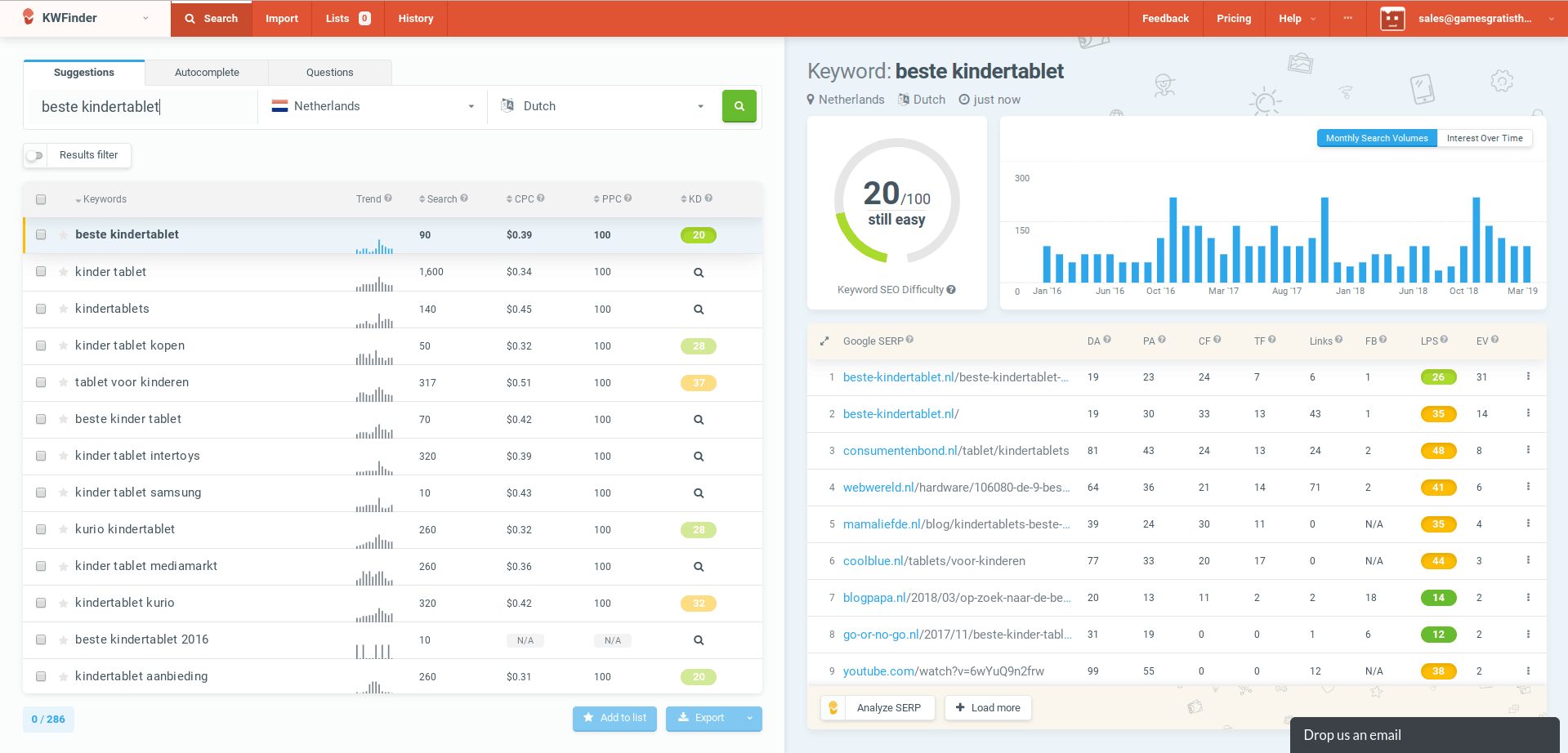
As a keyword tool clearly aimed at bloggers and beginner SEOs, I also think it’s great for presenting a lot of, for other confusing information, in a way that my clients understand too.
To show you how great KWFinder’s interface is compared to other keyword search tools, here’s what Long Tail Pro looks like:
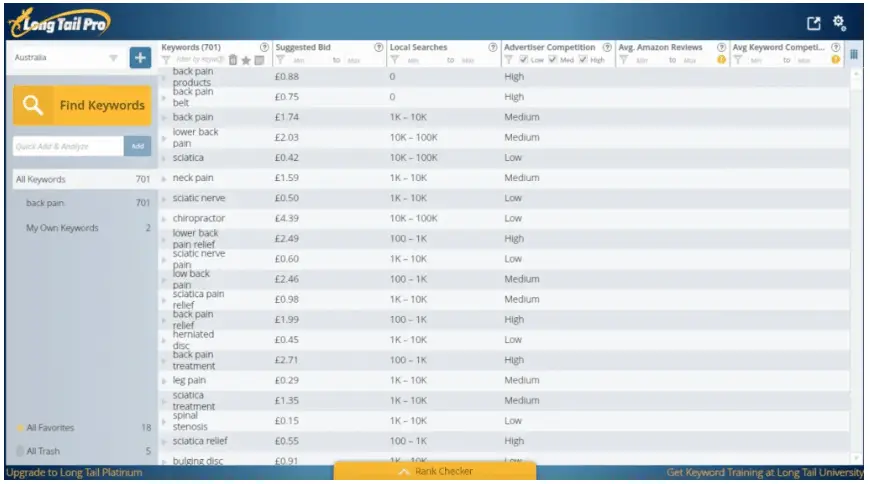
And here’s what SECockpit looks like:
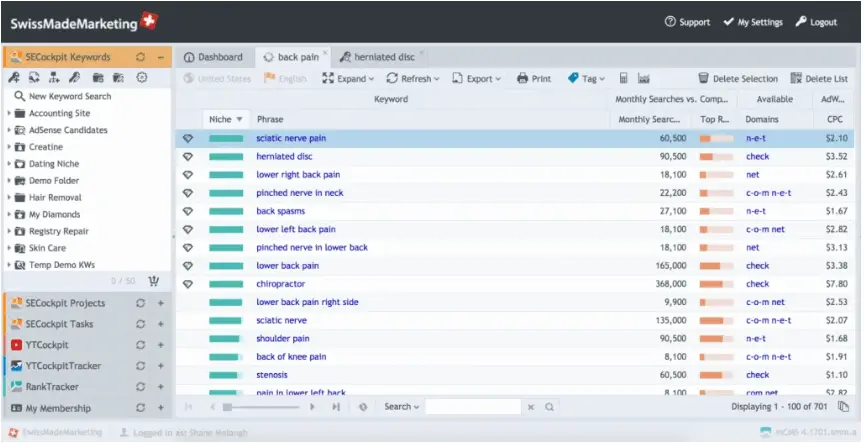
I think we can all agree that KWFinder is miles ahead in the UI department and it makes the tool so much smoother and more fun to use.
Reliable research with accurate search volumes in alle talen
As you may recall, Google recently changed the way search volumes are displayed in the keyword planner.
Before the update, you could view specific search volumes for individual keywords. Now they combine close variants and related keywords in one, so they are no longer suitable for finding deeper keywords to write about.
While there are solutions, the data is now much less accurate for most of us and increasingly difficult to count on.
What’s interesting is that KWFinder actually pulls its search volume data from Google’s Keyword Planner, but it applies its own internal algorithm to maintain those exact search volumes for all keywords.
Not only are the search volumes kept intact, but they are even more specific than what you normally see in the keyword planner.
The benefits of web-based
I really love that KWFinder is a web-based tool and essential to me as a lightweight Chromebook user.
In my opinion, some applications are just not meant for desktops and I think keyword research tools definitely belong in that category. The benefits are just too hard to ignore.
Since it is a web-based application, you can access KWFinder from any computer with an internet connection and a web browser. Compatibility issues are more or less eliminated and software updates are seamless, in real time.
Another great advantage, more specific to keyword tools, is that you don’t need to sign up a personal adwords account (or any other account) for it to work properly. Everything works neatly immediately after creating your account.
Long Tail Pro asks to link an adwords account
For example, Long Tail Pro asks to join an adwords account. As someone who has experienced the drawbacks of desktop-based keyword tools, it’s refreshing to see that KWFinder has chosen not to follow the more established tools like Long Tail Pro and Market Samurai in this regard.
Quickly discover the Keyword Competition Level
The most requested feature of any keyword research tool right now is the ability to calculate a single keyword difficulty score for a given keyword.
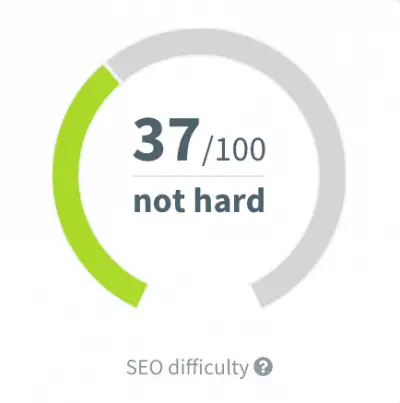
While the scale varies depending on which keyword keyword tool you use, this value indicates how hard it is to rank on the first page of Google for a particular keyword combination.
Not only does KWFinder calculate a difficulty score for each keyword (based on Majestic’s data), but it does a good job of putting the numbers into perspective:
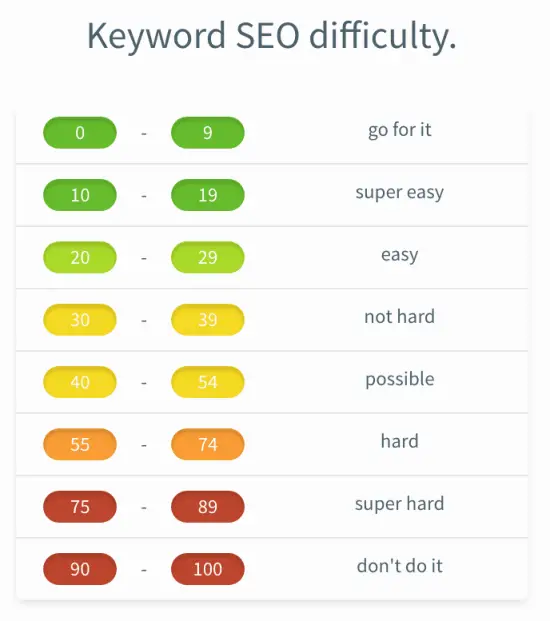
The color coding is a nice addition, making it easier to scroll through lists of keywords and spot those low-competition gems at a glance.
But I also want to make an important point here, because these scores will vary from tool to tool, so having a point of reference is critical to understanding what they really mean to you.
For example, I make the combination with SEMrush myself because I like the way you can look at your link profile but also at your competitors, and at first I was a bit confused by the big difference in difficulty figures.
At first I thought everything was super-hard in KWfinder (I used SEMrush before).
The results do show some correlation, but it’s clear that these tools use a different algorithm and that’s what makes a reference point so important. You should always view it relative to other words and difficulty levels within the same tool.
There’s one thing I don’t like, which is not being able to calculate keyword difficulty levels for multiple keywords at once.
If you have a long list of possible keywords, you’ll need to manually click them (with a few seconds delay each time) to generate a difficulty level.
By the way, this is something that Long Tail Platinum Cloud does automatically for all results.
My guess is that this feature is not included in KWFinder, because it could get you through your number of checks per month much too quickly with a smaller package, for example, but I’ll get to that later.
The good news is that I found it to be a fair indication of the real competition behind a particular keyword. While I always recommend a manual review before targeting a keyword, KW Finder’s keyword score was surprisingly reliable.
Always use the combination
difficulty of the websites on page 1, with KWfinder,
and the difficulty of the content by clicking on the websites.
These are two separate competition levels that your website and web copy must be able to beat if you want to rank.
Even if you were to rely solely on this statistic, I believe you’ll still be able to come out on top for most of the keywords you find based purely on the fact that you’re scoring a low keyword difficulty (between 1-30 in in most cases it is doable).
Easily evaluate SERP competition strength
The SERP Checker preview appears on the right when you select a keyword suggestion in KWFinder. It’s essentially your Page 1 of Google analytics and works very similar to what you get with most keyword research tools today.
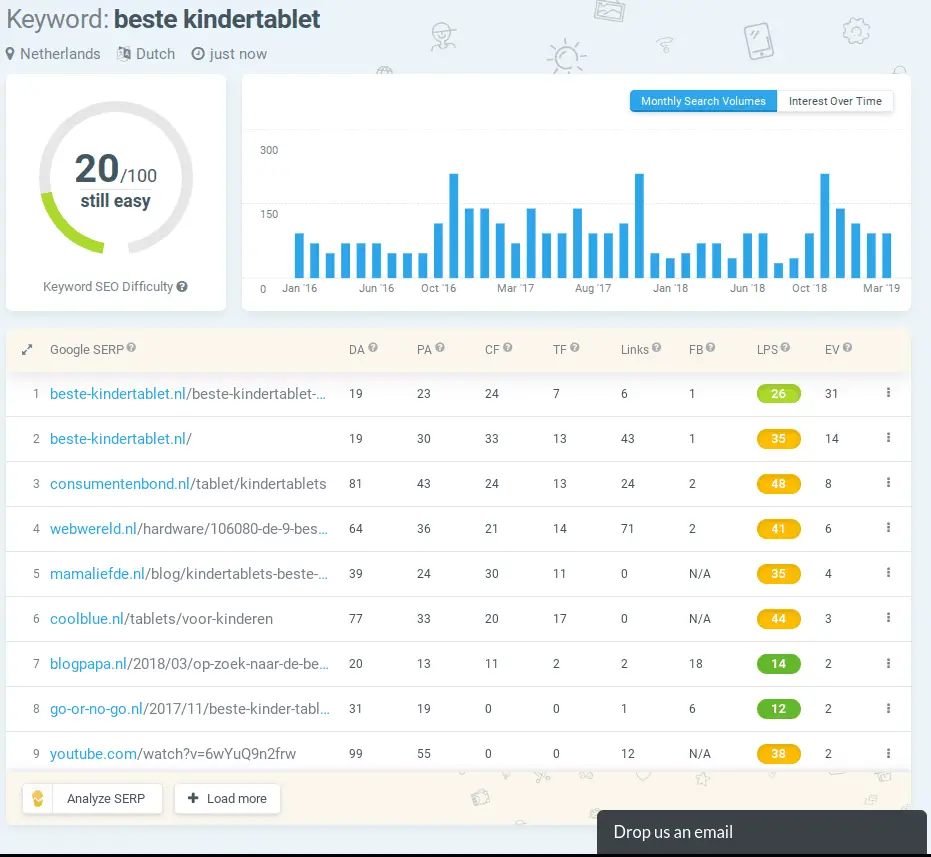
To open the full SERPChecker application (which runs independently of KWFinder), click the link below the overview.
Despite being a standard feature, there are a few things that set SERPChecker apart from the competition.
First of all, it’s nicely put together from a design standpoint. Super easy to take and color codes the data even more than what you see in KWFinder.
This is also where you can dig deep into competitor analysis. The ‘Manage Stats’ button opens up a whole new world of data for you to search and compare.
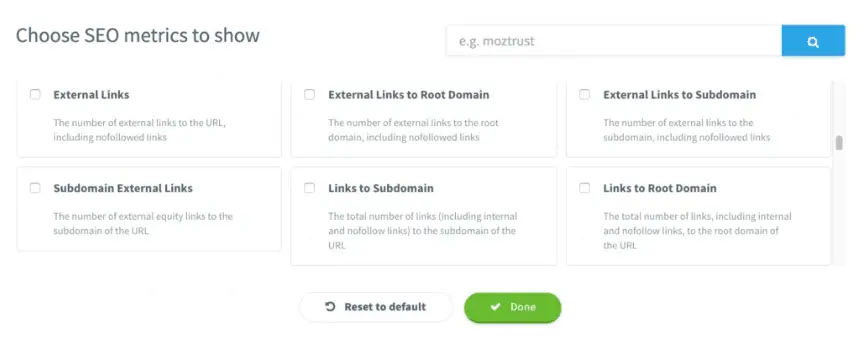
You can use this to completely customize the SERP Checker data columns.
The SERP checker is essential for manually assessing keyword difficulties. That said, I don’t think there’s much justification for making it a separate application.
I don’t always use the function itself when I do research, also because the most important functions are often already present in the concise overview in KWfinder itself.
Sure, it’s nice, but aside from being able to fetch more data, it wasn’t any more useful than the SERP Checker preview found in the KWFinder interface.
In fact, the only reason I would ever open the SERP checker would be to access the data not available in the example. In other words, if you can tweak the SERP check (within KWfinder), the external application would be almost redundant.
In general, I think that, combined with the keyword difficulty score, most people will find the SERP Checker example satisfactory in analyzing the SERP competition. When in doubt, you can always take a moment to dive into the external application.
Find hidden gems with multiple research options
Using multiple research options is a feature I haven’t seen integrated with other major players in the keyword research market.
While I myself still often go through other (free) tools like answerthepublic and especially the related keywords in Google search results itself to get some extra ideas for seed keywords, I was able to get an entirely different set of keyword ideas using the research questions ‘Autocomplete’ and ‘Questions’ built into KWFinder.

The only drawback was the limited number of results displayed in KWFinder, especially in Questions using Dutch keywords.
This ensures that I often still search for additional keyword ideas in Google itself, and then use them again for even more results in the KWfinder tool.
So let’s break down what these options are and how they work:
- Suggestions: this is the default search option. It pulls in keywords the same way you’d expect using Google’s KWplanner and applies its own internal algorithm to sort the results.
- Autocomplete: Autocomplete pulls in words using Google’s autosuggest feature, which are basically the suggestions you see when typing into Google’s search box
- Questions: The questions feature is useful for looking up information-based keywords by adding certain prefixes to your seed keyword, such as: How, What, Where, When… But like Answerthepublic, I use it pretty much only to search for my words in English and in this way to find questions that can be used for English sites I work with or to translate the questions and answer them in your language (handy tip if you always get stuck in your original language)
A handy overview with the most important data at hand
The whole idea of a keyword research tool is to help you find low-competition keywords as quickly and efficiently as possible.
One of the most obvious ways to achieve that is through the power of data aggregation. Presentation of all necessary data in one central location, allowing the user to make a reliable assessment of the viability of a given keyword.
While I would have preferred more link-based data rather than things like Facebook likes and G+ shares, overall the overview is very good.
As mentioned, you can find a ton of information from other data points by opening the full SERP Checker application and playing around with the data options, but it’s always a few clicks away, which isn’t ideal.
So it’s especially strong when you use the difficulty level as-is and trust that it’s almost always a good estimate of whether you should go for a particular keyword in your content.
Few other tools give you this level of actionable data on a single screen without feeling too clunky and overwhelming.
View your results smartly with simple filtering
KW Finder has all the filtering and sorting options you’d expect in a solid keyword research tool. Nothing special in that regard.
However, I found the ability to quickly toggle filter options on and off a very nice addition.
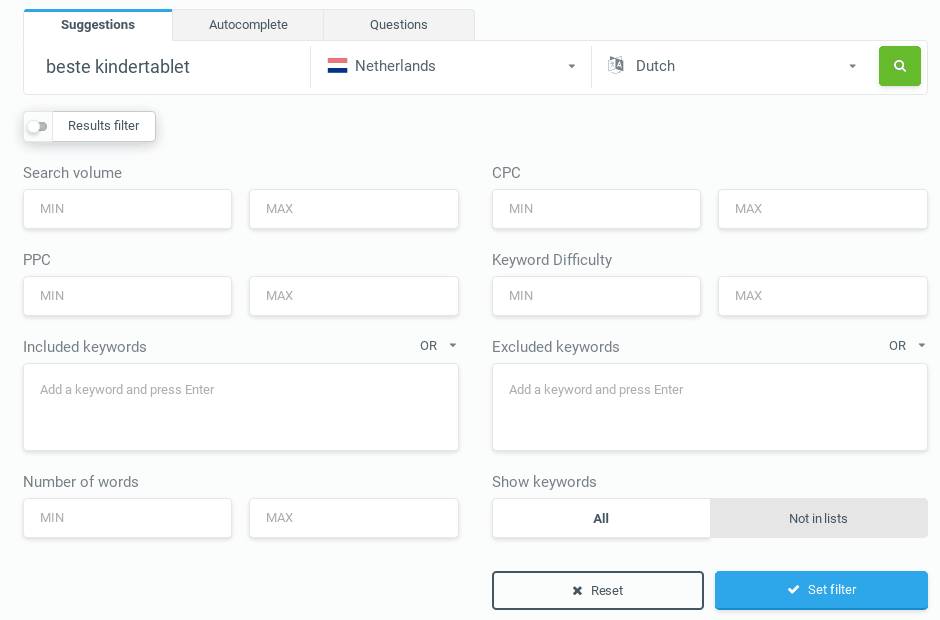
This was particularly useful because performing a new search remembers the last filters used, so it was a useful time-saver to apply my usual filters with the touch of a button.
One small thing I would change is that filters are kept by default for every new search. I found myself turning them off most of the time, but might be useful for some uses.
A helping hand with live chat support
Great support is something we often expect with online services and products these days, but that doesn’t mean you always understand.
Fortunately, KWFinder has the usual support options and documentation, including a regularly updated blog, email support, and even live chat.
I tested the live chat at two different times during the day and both times I got a helpful response in less than a minute. Not bad at all.
Potentially problematic search limits
Unlike most other SEO tools on the market today, KW Finder uses some sort of “credit” system to limit the number of data requests from a particular user.
It is logical. After all, requesting a ton of data strains resources which inherently increases costs. Not to mention the cost of acquiring the data itself.
The real question is, how do these limitations affect your ability to adequately conduct keyword research?
Here’s how KWFinder breaks it down:
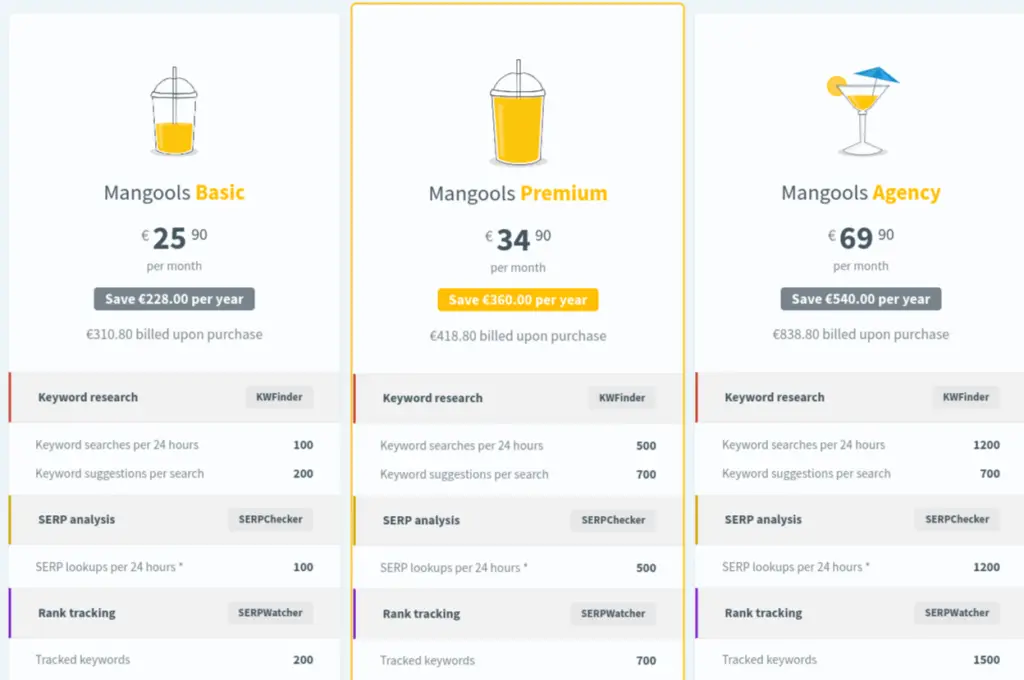
I started with the basic package myself, but soon switched to Premium when I started using it for all the websites I work with.
Initially 100 searches per day seemed like a reasonable limit and it’s perfect for those with only 1 site or bloggers. However, what I found after testing was that I went through my per diem much faster than expected.
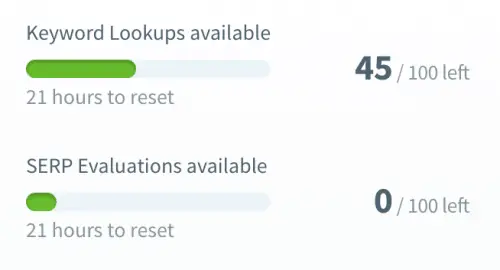
But of course you can easily stop and pick it up again the next day, the price is certainly worth it. If you work as a professional, you obviously cannot keep customers or prospects waiting.
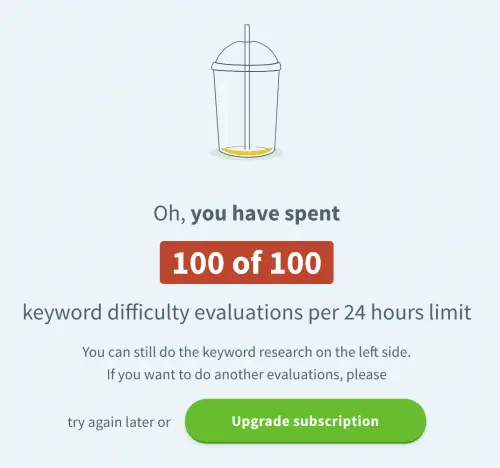
That said, I found KWFinder to be a lot more generous than Long Tail Platinum Cloud, which gives you a monthly quota (not daily).

Since their quota is based on the number of results and not actual searches, you can literally empty your allowance in a day if you’re not careful and then have to wait a month instead of a day to get going again.
Of course, if you’re only using KWFinder on a need-to-know basis as opposed to collecting months of keyword research that you want to do all in an afternoon, don’t worry, as the limit resets every 24 hours. Just something to watch out for.
Limited keyword results
Probably one of the biggest drawbacks of KW Finder is the limited number of keyword results. Depending on your plan, the results are capped at 200 or 700.
I found this rather limiting, especially when you compare it to the sheer number of results other tools return for the same query.
The limitation of the results was particularly annoying when I tried to use filters to narrow my search to find more specific results. Since the limit is applied first and then the filters, I was usually confronted with this screen:

Handy deep dive option
Usually I now look at the suggestions that I get (700 in the premium plan), which is already quite a lot, but based on the suggestions I look for further refinements in order to eventually reach all possible keywords for my web texts to come.
As I explained at the beginning of this post, traditional keyword research involves inserting seed keywords and using the suggestions to take advantage of better opportunities.
Thankfully, the guys behind KWFinder have added the ability to start a new search based on a keyword suggestion.
Unfortunately, as I soon discovered, the problem is that the tool doesn’t allow you to open these searches in a new window or tab. Instead, it actually replaces the suggestions you currently have and is therefore only suitable for moving to a new search when you’ve completed everything from your previous assignment.
Unlike Long Tail Pro, for example, it just lacks the efficiency of being able to switch between different tabs without losing your current set of results.
So in the end I open multiple tabs in Chrome myself to quickly switch between my main search and a deep dive I want to make for specific keywords.
Link stats in the preview
Another thing I quickly noticed about KW Finder was the lack of certain link-related metrics shown in the SERP analysis example.
While it shows you how many dofollow links point to each individual page, you just don’t get the full picture and this may drive experienced SEOs to another tool.
For example, it doesn’t tell you the number of referring domains — an important piece of information when it comes to evaluating a site’s strength.
When you consider how crucial links are to keyword research, it seems a little odd that KWFinder chooses to omit such important data points in the SERP Checker example.
The only way to view this information is to open the full SERP Checker application for each keyword phrase and enable the additional stats. Unfortunately, there’s no way to change the stats shown in the SERP Checker preview so until they make a tweak to the interface you’re stuck with this way of working.
However, as I said it is not necessary if you rely on the difficulty score that KWfinder has assigned to the domain.
Is KWFinder Right For You in Your Language?
KWFinder is an excellent piece of software that stands up to the heavyweights in the keyword research arena. But while it’s the best research method for some, it’s not quite right for everyone.
Beginning Bloggers
If you’re new to blogging and are still finding your way around SEO and, more specifically, keyword research, this tool will be an absolute dream.
It’s by far the most intuitive keyword research tool I’ve ever used, and it provides a platform that allows anyone to pick profitable, low-competition keywords in minutes.
The One Click Difficulty Score for keywords is undoubtedly one of the biggest incentives for beginners to use this tool and I think it will save newbies a lot of wasted time chasing down keywords that are just too competitive.
With the absence of more advanced metrics within KWFinder, it almost feels like a deliberate move to appeal to more novice marketers. Of course, that’s not to say it doesn’t do its job well, because it does. It feels more beginner-oriented in that regard.
Budget bloggers
If your main concern is starting your business, KWFinder is very reasonably priced compared to other keyword research tools.
While the lowest paid plan is $29 per month, paying per year gives you a huge discount of 60%, which is about $12/month.
It says 50%, but it’s actually closer to 60%. You can then pay once, which is not so bad because of the affordable subscriptions, and then you don’t have to worry about it for a year.
Even without the bulk discount, KWFinder is still very competitive over other popular keyword tools.
| Keyword-tool | Price per month |
| KWFinder | from $ 29 per month |
| Long Tail Pro | from $ 37 per month |
| Ahrefs | from $ 99 per month |
| SECockpit | from $ 40 per month |
| SEMrush | from $99,95 per month |
| Market Samurai | $149 one time fee |
If you’re on a really tight budget, you can always sign up for a month, use it every day, and build enough keywords to power your blog for a whole year. Don’t forget to export your keywords before your membership expires.
When your content strategy is up, you can always sign up again for a month.
High Level Marketers
If you run a full scale agency or use a lot of SEO tools, you may find KWFinder a little too basic and potentially limiting for your needs.
While it can be combined with other tools like SEMRush for competitor analysis, the paid plans for those tools also largely eliminate the need for KWFinder in the first place.
However, I do like the simplicity of the dashboard and the way you can share those results with customers to communicate your work in understandable language.
Overall, it’s still an excellent tool with a lot of strong features, but I feel like these limitations put KWFinder out of the race as a high-level marketing tool.
KWFinder foreign language Tutorial
Finding Foreign Informational keywords with KWFinder
Informational keywords are terms and phrases that people use to find answers to problems. Unlike commercial keywords (or keywords with buyer intent), you don’t try to sell anything with your web copy, at least not directly.
To find informational keywords in KWFinder, you can start with a general search with your work area as the seed word:
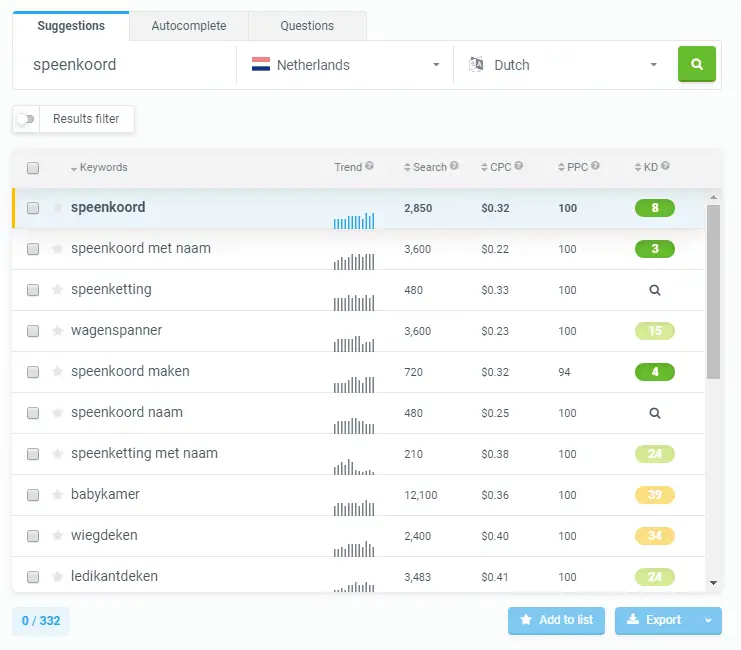
From there, you can analyze specific suggestions using the keyword difficulty as your primary indicator.
Click on a keyword and wait about 3 seconds to calculate a difficulty score based on link statistics. Once it’s calculated, you can see it at a glance in the keyword suggestions window.
This is kind of a shotgun approach, but it should be pretty good at bringing in some keywords that are already informational by nature. So in this example I could write a sample article around the keyword “dummy cord with name”.
This search phrase has a massive 3,600 monthly searches and a low difficulty score of 3. As you can see, it’s very possible to find some decent keywords using just the default search option.
However, KW Finder tries to give you a helping hand in finding informative keywords. Using the “Questions” research question, you can add specific keyword-based keyword suggestions without extra work.
Using the same seed keyword as before, I was able to retrieve a whole host of keyword suggestions that I wouldn’t normally see in the regular search tab – just by adding KW Finder’s own question-related prefixes.
I found the results of using this research option on the low side in terms of search volume, but that doesn’t mean they aren’t worth focusing on. There are a number of good options for informative content.
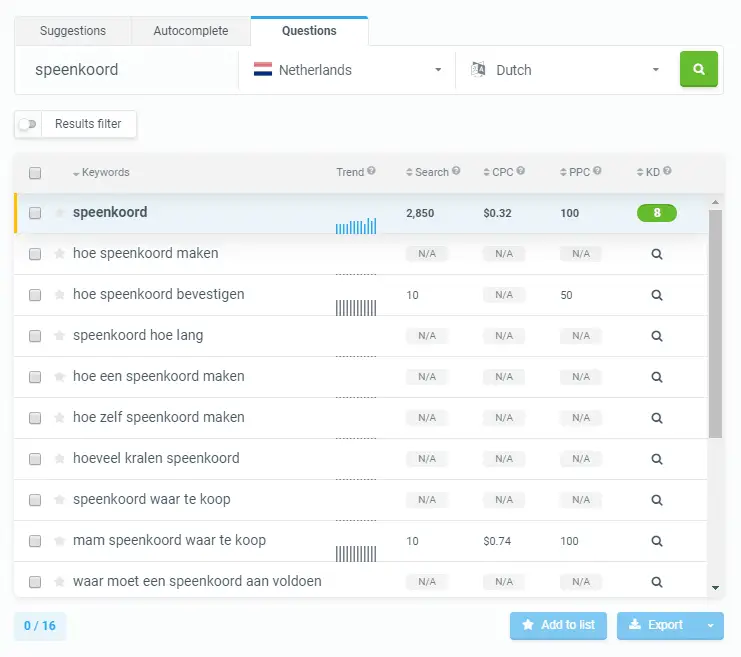
Overall, it’s a nice option to have and you can pick some great keywords from time to time using this research opportunity, but at this stage it isn’t advanced enough on its own to replace other, outside research tools.
In my opinion, the hybrid approach still works best.
Find foreign commercial keywords with KW Finder
Commercial keywords are terms and phrases that people use when they want to buy something, when they have “buyer intent”. As a result, these types of keywords convert very well. Unlike informational keywords, the primary goal is to make a sale.
If you want to search for commercial keywords in KWfinder, you can start with a general search with your niche as the keyword:
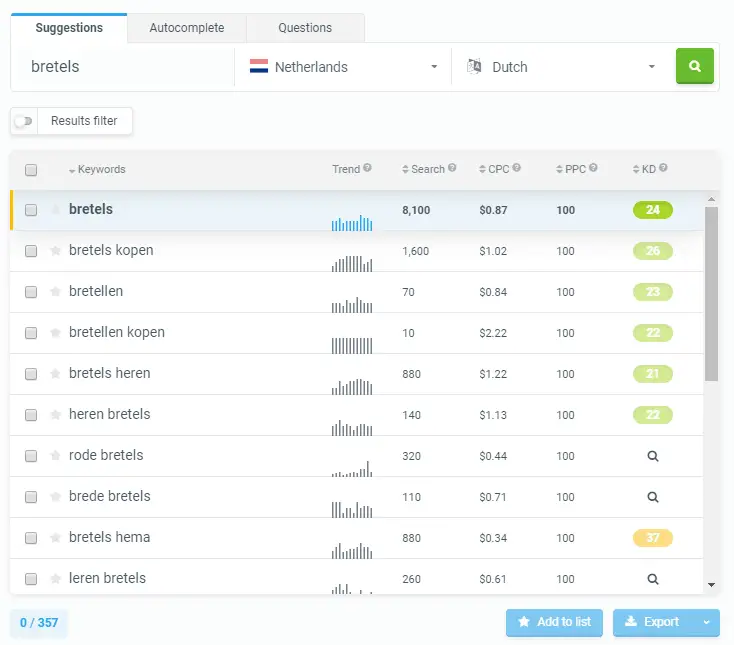
Once you have suggestions for your keywords, the first thing you want to do is use filters to narrow your search.
Filters are especially useful for commercial keywords because they almost always use specific modifiers. Unless we’re talking exact product names, the modifier is often what gives a commercial keyword in the first place.
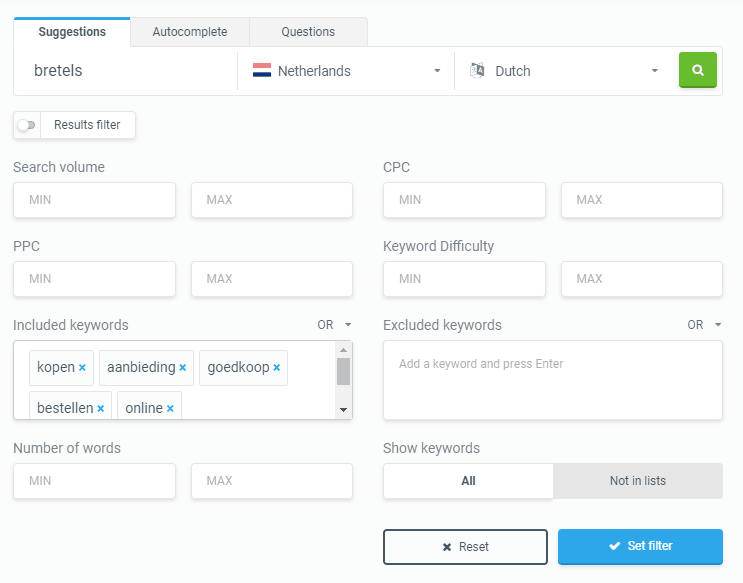
What you will often encounter when using KWFinder for commercial keyword research, and something I discussed earlier in this review, is that you often don’t get keyword results after applying specific filters. But if your niche is big enough and you have a more extensive plan, this is not a problem:
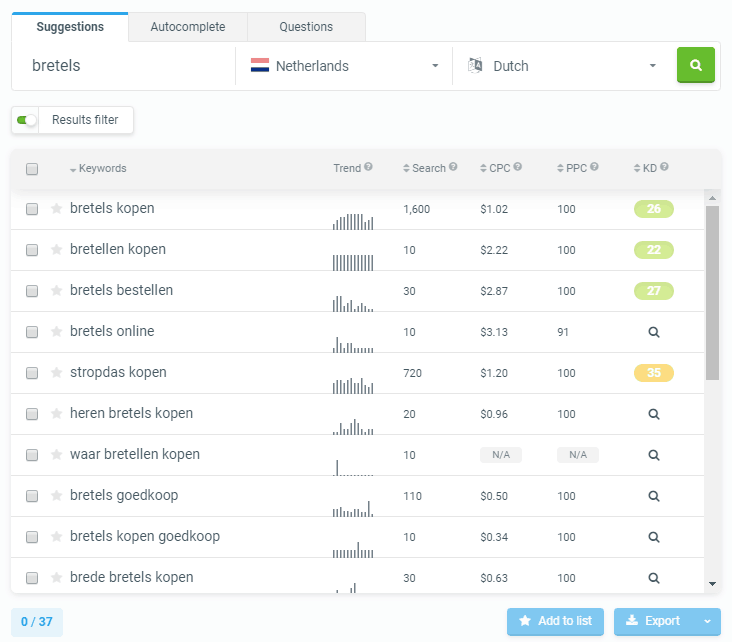
This is because KWFinder only displays a small number of keyword suggestions, from 200 in the basic plan and 700 in the premium plan. In other words, the first example is just too small to work with because it looks up 200 words first and then filters.
Instead, you have to constantly go through your keyword suggestions, make new searches, and apply the same filters until you finally find long-tail gold.
Not efficient by any means, but there is a solution you can use to improve the quality of your results and reduce the amount of time you spend doing new searches.
The trick is to use commercial modifiers as part of your seed keyword, rather than using them to filter the results after the fact.
Now, there’s another tool I found useful in KWFinder and that’s the “Autocomplete” research option that lets you display an entirely different set of keyword suggestions.
While this option tends to generate lower search volume results, you can use it for some highly targeted commercial keywords that are much easier to rank for and still worth considering as part of your overall keyword strategy.
This way you can find enough words that your niche needs.
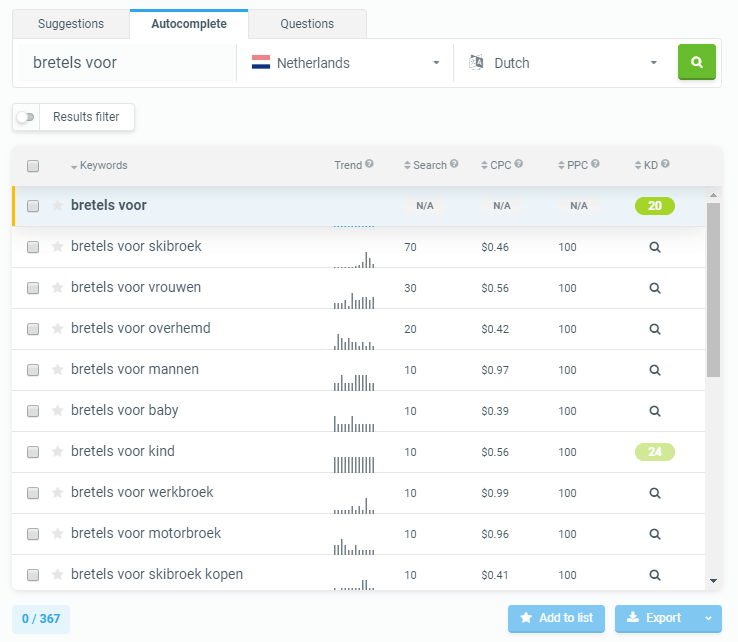
Conclusion
Despite some minor hiccups here and there, I really liked KWFinder and use it as standard in my research.
For example, someone familiar with research tools will know Long Tail Pro, but KWfinder’s user interface is so refreshing to use and incredibly efficient at presenting large amounts of data in a relatively small space. It especially helps to properly explain difficult data to your team and to your customers, but it is also particularly suitable for novice SEOs to have a lot of guidance.
The additional research capabilities do a good job of providing unique keyword suggestions without having to leave the tool. While it’s not a complete all-in-one tool, I think it’s a step in the right direction.
With some functionality variations like multi-tab research, batched difficulty calculations and customizable SERP Checker preview – KWFinder would be nearly flawless as a traditional keyword research tool.
When it comes to competitive research, it only makes sense when combined with other tools (like SEMRush), which won’t get you very far with a free plan. Something to consider if you’re more interested in that method of research.
Choose one of the packages to try it out.
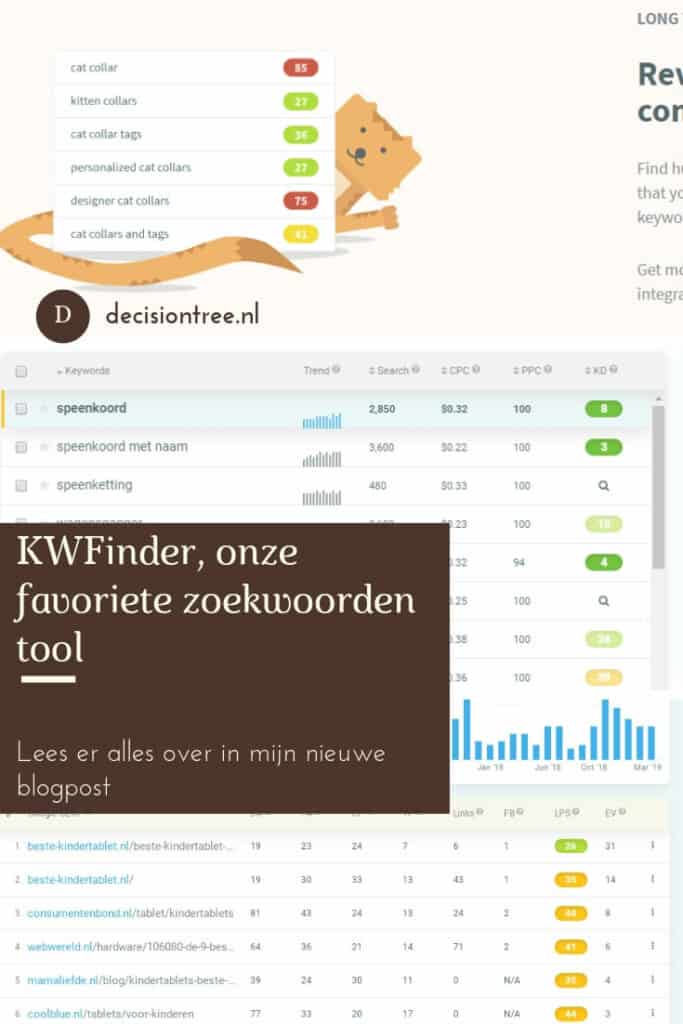
I hope this review has been of some use to you. It is a tool that I also use in my marketing. If you decide to purchase a paid package, I will receive a commission for my reference, at no extra cost to you.
Joost Nusselder is The Content Decoder, a content marketer, dad and loves trying out new tools en tactics. He's been working on a portfolio of niche sites since 2010. Now since 2016 he creates in-depth blog articles together with his team to help loyal readers earn from their own succesful sites.
